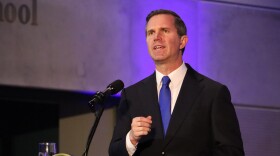Americana Community Center has served Louisville’s refugee and immigrant communities for over 30 years. Last month, the nonprofit hired Ricky Santiago to be its new executive director.
Santiago talks with LPM about the financial challenges Americana has weathered, his hopes for future sustainability, and the resurgence he believes the organization is making.
This conversation has been edited for length and clarity.
Michelle Tyrene Johnson: What does it mean for you to be in charge of Americana?
Ricky Santiago: Americana is such an iconic institution. It's an honor to serve. I consider the founder, Edgardo Mansilla, a mentor and a friend. So being able to just follow in that professional footstep as a Latino leader in the city is an honor. There's a lot of work to be done. I tell the staff all the time: We're going to bring a commitment to excellence, to bring the organization back to where it used to be. And I think we're heading in the right direction. Our (fundraising) gala was a great display of that. The community wasn't sure if Americana was going to be around for the gala. I took over on Oct. 20, and we had 80 tickets sold. We ended with about 340 tickets sold by the time the gala rolled around in November.
MTJ: What do you attribute that to?
RS: I think it's a bit of a change of culture in the organization, new leadership and just continuing to foster those relationships.
MTJ: How many people work at Americana?
RS: We have about four full-time staff now, and we have about six part-time staff. But of course, we're going through a sort of reorganization. We have to do some reorganization due to the pressures of a nonprofit. But I think we're heading in the right direction to be where we used to be.
MTJ: I know that the organization has been around for 30-plus years. How many people do you serve?
RS: We serve thousands of people a year. During our diaper drive alone, we serve hundreds of families a week in need of diapers. We want to build on top of that. One of the things that I've understood as a former public employee is that we shouldn't work in silos. So we are working diligently to make sure that a diaper box isn’t just a diaper box. How can we turn this box into a vessel of information? We're in the business of people, and every touch point is important, and we need to maximize our touch points with people.
MTJ: Who exactly do you all serve?
RS: We serve everyone. One of the big campaigns that we're working on for next year is that Americana is for all. But in our core, in our DNA, we are an immigrant service organization.
MTJ: What is your primary focus in terms of financial sustainability?
RS: We need to refocus our shift onto our donors. I think what Americana has is a trusted name, a valued name, with a long history in the community of doing great work, and we need to bank on that. We need to bring our donors through the doors to make sure that they're part of our family, and not just writing a check. Because, in reality, these are social investors. They want to see a change in their community. They may not have the time or the capacity to do it, so they're trusting us to do it. That is going to be our focus for the transition.






